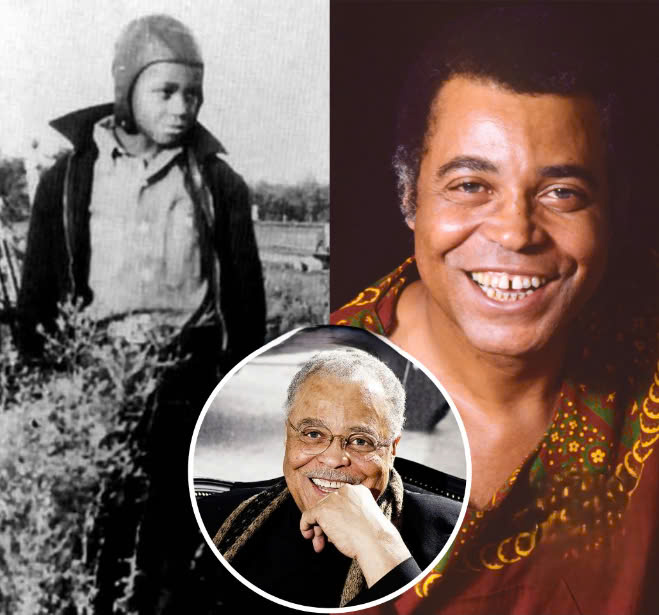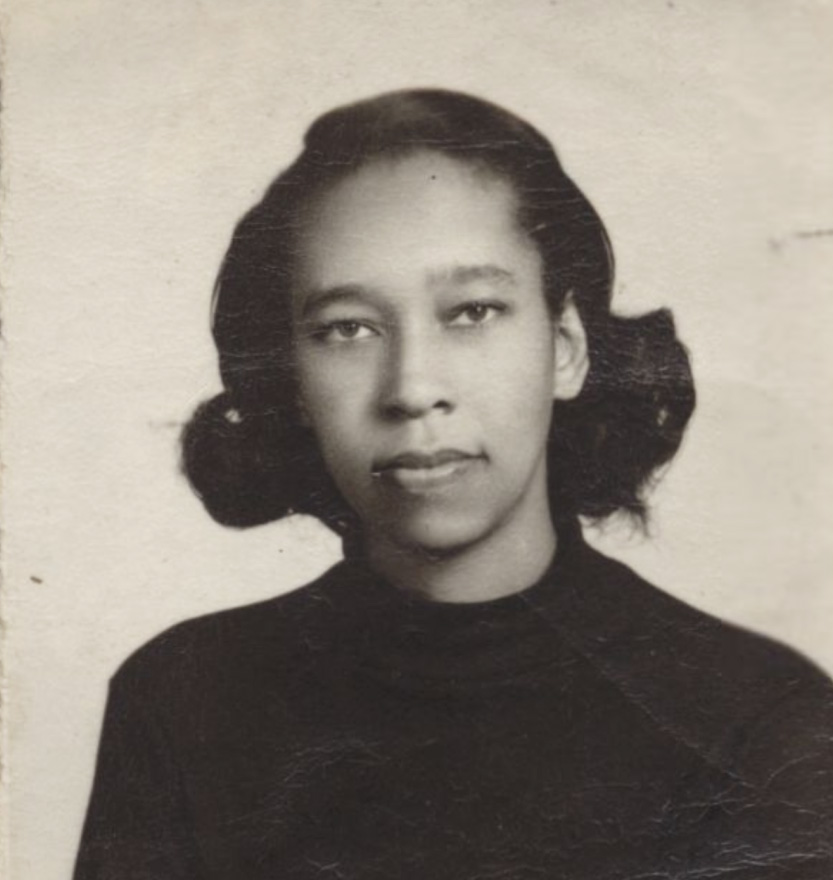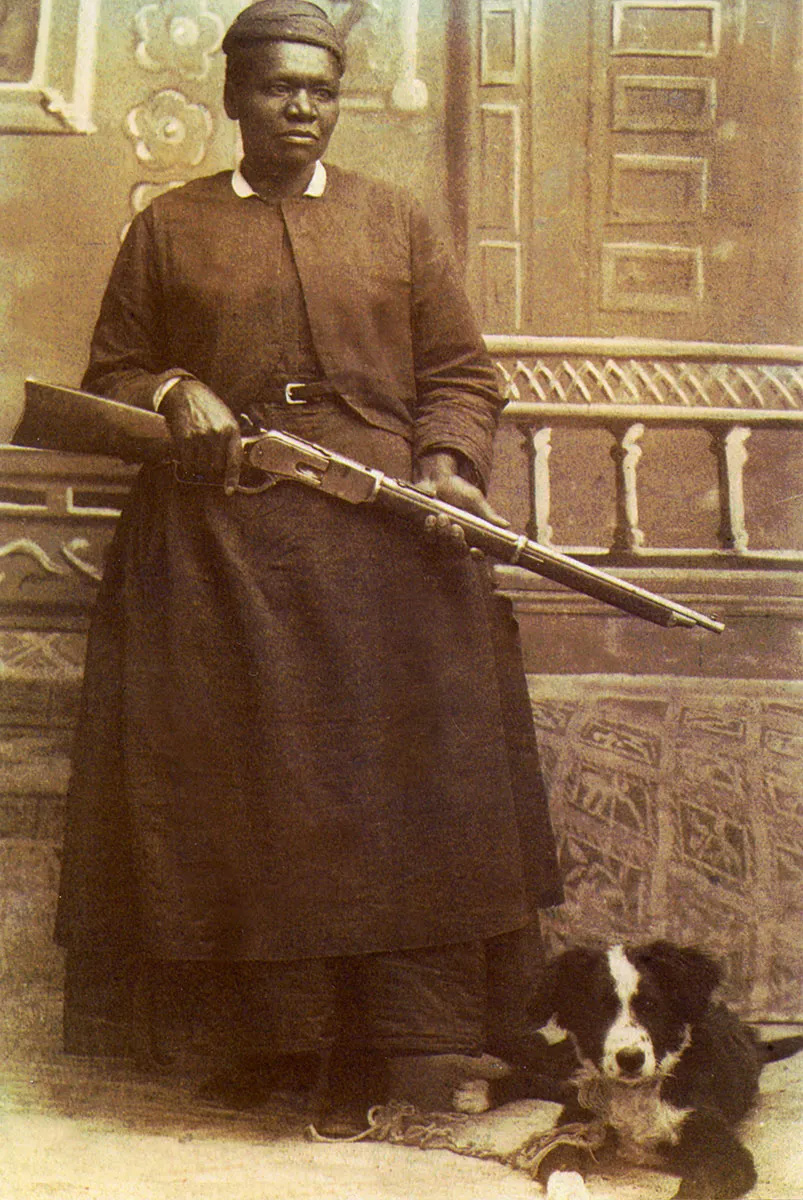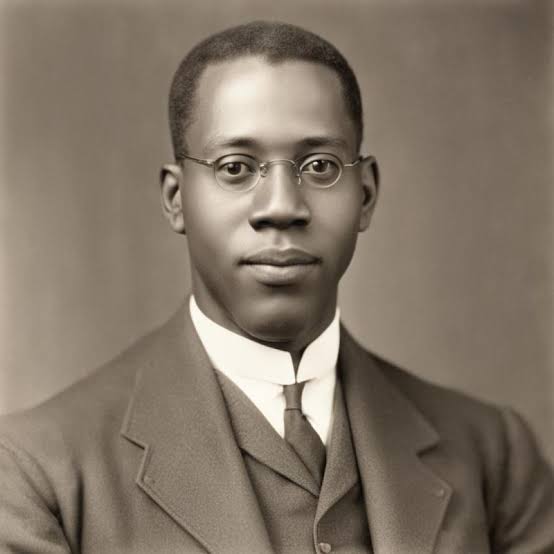Brandie Medina grew up watching both of her parents graduate from St. Edward’s University.
She was just 1 year old when she first attended a commencement ceremony at the private Catholic university in South Austin, where she watched her father receive his undergraduate degree. Later he earned his master’s degree. A few years after that, her mother earned her undergraduate degree from the school.
Though Medina, 42, opted to go Prairie View A&M University — one of only a few of historically Black colleges and universities in the state — for her undergraduate and master’s degrees, she said she was determined to come back to her parents’ alma mater and continue her family’s legacy by walking at her own commencement at the school.
In fall 2019, Medina began the virtual Doctorate of Education of Leadership and Higher Education program at St. Edward’s. The university’s first-ever doctoral program was “designed to prepare students for success in the rapidly changing world of postsecondary education,” according to the university’s website.
And on Friday, during the St. Edward’s fall commencement, Medina not only accomplished her goal of officially joining her parents among the university’s alumni, but also became the first Black woman to graduate from the school with a doctorate. Six other students joined her as part of the first cohort to complete the program.
“It’s not really highly expected of Black individuals to go to predominantly white institutions, so for both of my parents to finish their degrees there, and to go off and become highly successful, that resonated with me,” Medina said. “It showed me that by going to St. Edward’s and finishing my doctorate degree, as long as I persevere, I can be highly successful as well.”
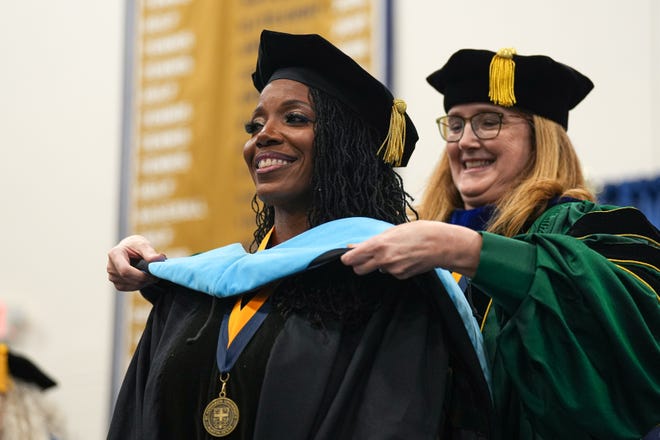
Medina, an early college administrator in the High Island Independent School District near Galveston, is one of a small but growing number of Black women who have accomplished the feat. According to the National Science Foundation’s Survey of Earned Doctorates, about 3.4% of doctorate recipients in the U.S. were Black women in 2021, the latest year for which data are available.
Medina, who wrote her dissertation on “The Intersectionality of the Professional Black Woman in Education Administration,” said she faced several barriers trying to finish the program, but it was worth it to be able to join the “small sliver” of Black female doctorates from around the nation.
“We haven’t overcome the social barriers that Black women face,” Medina said. “We haven’t fully overcome the historical dispositions of segregation in schools. Black women have been put, when it comes to intersectionality, … at the bottom of the totem pole, so it’s powerful to be a part of those that made it.”
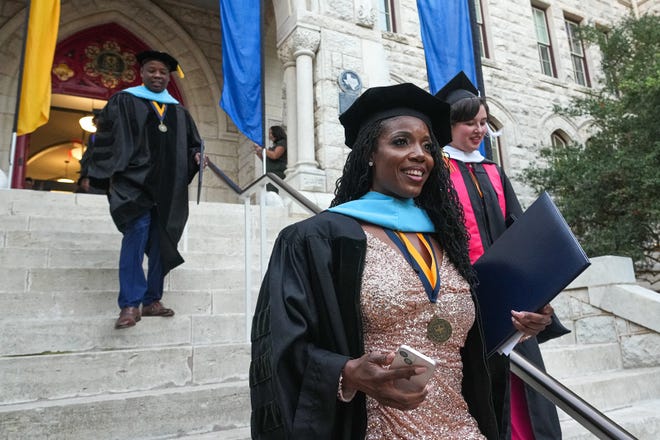
The Doctorate of Education of Leadership and Higher Education program teaches students how to handle crises, maintain ethics in leadership and research postsecondary education — all through a lens of diversity, equity, inclusion and social justice, multiple students and administrators told the American-Statesman.
“Two decades into the 21st century, I think we’re recognizing that the demand for really more holistic leadership across the bandwidth of organizations is something that can’t be denied, and so we wanted to be part of helping to educate the next generations of leaders at St. Edward’s because of our mission and the perspective that we bring to the higher education space,” program director Tom Sechrest said.
Several of the students wrote dissertations focused on diversity in education, including Latina leadership and cultural intelligence, why students of color join historically white Greek Life organizations and the experiences of 𝘤𝘩𝘪𝘭𝘥ren of farmworkers in the College Assistance Migrant Program, said Ellen Melton, the university’s director of graduate and professional studies.
“These students had an interest in creating their dissertations around a diverse population, so I’m hoping that this infusion of diversity that our doctorate students bring to education lifts all of education up,” Melton said. “They are all extremely dedicated to what they believe in and what they want to bring to higher education, and that’s diversity, equity and inclusion.”
Nearly every member of the school’s first graduating cohort of doctoral students is a person of color, with the first Latina, Latino, Black man and Black woman to graduate from St. Edward’s University with a doctorate.
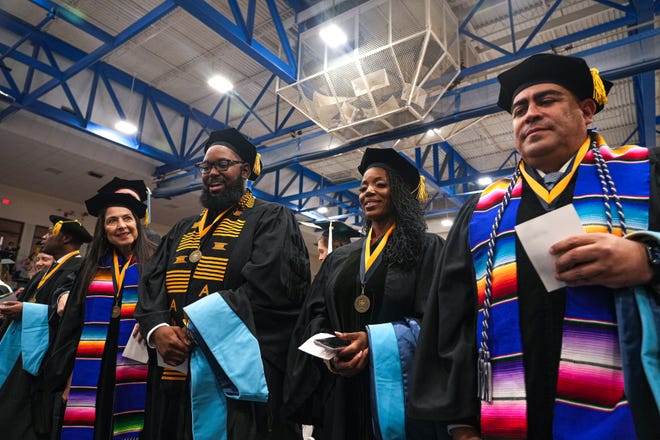
Valedictorian Melinda Rodriguez, the first Latina to graduate from the school with a doctorate, said there was “no doubt” in her mind about coming back to St. Edward’s University to earn a doctorate after graduating from the school with her master’s 22 years ago.
She said her diverse cohort grew stronger together after experiencing the COVID-19 pandemic, civil unrest and several personal setbacks, including the loss of several family members, and eventually formed lifelong friendships. She said despite the challenges, all of the graduates are ready to bring leadership to the forefront of their lives and meet the needs of “21st century leadership.”
“They’re going to make a significant difference by having earned their doctorate, where they can model their leadership and make an impact on other future leaders,” Rodriguez said. “So I think this inaugural cohort is going to have a wonderful ripple effect throughout different sectors of work and model a future that is more diverse.”
More:With fewer on-campus voting sites for Austin runoffs, will fewer students vote?
‘I could have given up’
After tutoring other 𝘤𝘩𝘪𝘭𝘥ren as a young 𝘤𝘩𝘪𝘭𝘥, Medina said she felt that her purpose in life was to pursue a career in education, where she believed she could make a difference by continuing to help educate and support the next generation of students. Since then, she’s had a 20-year career in education, from working as a prekindergarten teacher in Houston’s Third Ward, a predominantly Black area, to her current job in administration.
Although she works in K-12 education, she said she uses her studies of higher education and leadership at St. Edward’s to manage the higher education department and support students who are pursuing dual credit classes.
“My purpose and my passion are these kids. … To see them be successful at college courses that I didn’t start taking until I was, you know, 18 or 19 years old, it’s amazing,” Medina said. “That’s what it does for me, knowing that I can still continue to give the gift of education to the students. This is near and dear to my heart.”
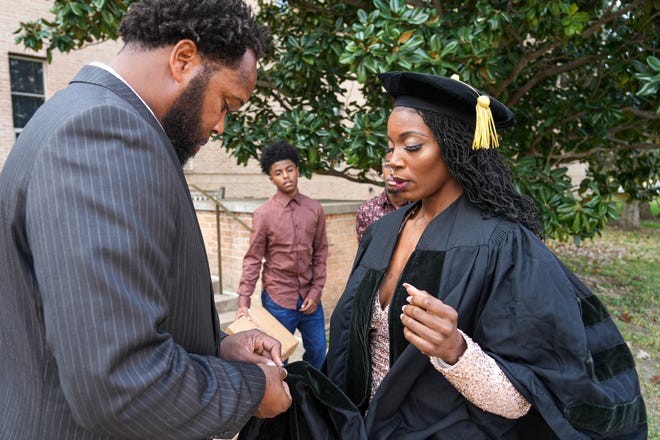
The degree, however, did not come without its challenges. Medina, who has four 𝘤𝘩𝘪𝘭𝘥ren, said she completed part of the program while living in a battered women’s shelter for several months and raising two teenage boys. Since the shelter didn’t have reliable Wi-Fi, she drove to a library on weekends to do her class assignments.
“I could have given up, but I knew that I wanted more for myself,” Medina said. “I knew that I wanted more for my kids. I knew that, if I were to give up, I’m going to end up right back where I started. I’ll still be a classroom teacher. There would be no growth in giving up.”
Medina said she hopes the yearslong journey to her degree helped her two younger 𝘤𝘩𝘪𝘭𝘥ren understand the significance of continuing their education and learn two important lessons.
“I was making a very strong point to teach my kids that, No. 1, you do not have to accept abuse from anybody,” Medina said. “And No. 2, when you set a goal, you go and get that goal. Do not set goals and decide to back out on it. Whatever it is that you set that goal for, you keep your mind on it, and you go get it.”
After more than three years of work, Medina and six other doctoral students got to achieve their goal of participating in the university’s Legacy Walk on Friday, a beloved tradition in which all of the graduating students walk through the heart of campus around the university seal after commencement.
Dressed in a black gown with three black velvet bars on the sleeves, a light blue hood and a black beret, they all finished the walk by stepping through the red doors of Main Building, where they became the first class of doctoral students in St. Edward’s history who can officially call themselves alumni.
